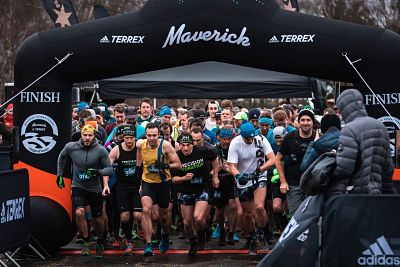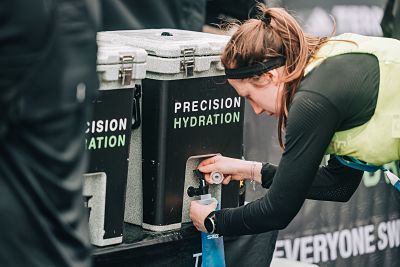Andy recently sat down with renowned ultra-running coach and author, Jason Koop, for an episode of his Koopcast podcast.
We also took the opportunity to ask for Jason's valuable insight into how to step up to ultra-endurance events and NOT fail – an approach that he was a fan of.
Over to Jason and his top tips...
Ultra-runners find success through a lack of failure on race day - Jason Koop
Accept that training volume increase isn't linear
The first thing to realise is that the training volume increase isn’t linear as you move up the distances. Most athletes who are training for an IRONMAN or a marathon will have the requisite amount of miles and time on their feet to run an ultra.
If you're going to transition from running a marathon to running a 50-miler, then you're not required to double your training volume. And, that's one thing that people have a hard time wrapping their head around because the distance is so much longer.
It's double, right, from a marathon to a 50-miler? But the training really isn't all that different from a volume perspective, it doesn’t linearly increase.
Get your ‘training architecture’ correct
The second thing is from a 'training architecture' perspective, it actually does change a little bit.
A lot of marathon runners, or even 5K and 10K runners, will design their training to go from ‘base building’ to higher intensities as the season goes along.
In ultramarathon, it's the opposite.
You want to go from ‘high intensity, low volume’ to ‘low intensity, high volume’ as you get closer and closer to the race.

Get comfortable with the unknowns
The third thing is, as you get closer to the race, you have to accept that there's going to be a larger quantity of unknown. And what I mean by that is that the distance between your longest ‘long run’ in training and the race is just bigger.
And what a lot of athletes try to do is they try to close that gap as much as they can.
So, let's say in a marathon, everybody wants to do a 20-mile long run before the race so there's 10 kilometres of unknown at that point in the game.
When athletes step up to a 50K or a 50-miler, they feel that they have to do a 40- or 45-mile training run in order to do a 50 and that's just not the case.
Your one single longest long run is really not that material to the entire context of training because you do so many more miles over so much more time. Lynch-pinning your training around the longest of the long runs is a classic training mistake that you want to avoid.
And so, it's kind of like a ‘psychological reading’ of the athlete. Really, they just have to accept the fact that there's a larger quantity of unknown - get comfortable with it. It's fine.

Dial in your nutrition and hydration strategy
The last thing I would say is you absolutely have to have your nutrition strategy dialled. You might be able to ‘get away with’ pretty ridiculous nutrition at the marathon distance, except when the races are really hot - that's when you pay the bigger penalty for having your nutrition screwed up.
But in ultras, you’ll always pay the penalty for screwing up your hydration and nutrition.
So, you absolutely have to have that piece of the puzzle wired. And it has to be an intentional part of your training build-up going into your event because it's just so critically important. There's no way that you can get away with a bad nutrition strategy for an ultra and expect to be successful.
One point worth flagging is to make sure you know what your sustainable rate of calorie intake is. A big mistake which I talk about with nutrition experts all of the time is that the 90 grams of carb per hour 'dogma' that you see recommended for an IRONMAN Triathlon and other endurance events, is not necessary for almost everybody in ultrarunning.
There's this blanket recommendation that you should be taking in 90 grams of carbohydrate an hour for any endurance event lasting over two hours or four hours (depending on who's giving the recommendation). But we very, very rarely see that in the field.
There might be five people on the planet that require that much carbohydrate intake in an ultra-marathon setting.
Mostly, it’s not sustainable for most people after a few hours. And we know that from practice, while the 90 gram advice doesn't come from the literature because it hasn't been studied extensively enough so far.
It's extremely rare that somebody can tolerate that much carbohydrate for those longer periods of time and, like I said earlier, it's really just not necessary, unless you're really good and really big.
